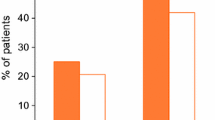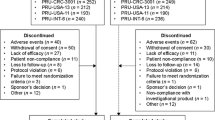Abstract
Prucalopride is a new prokinetic agent, recently available in Europe for the treatment of functional constipation in adults in whom treatment with laxatives failed to provide adequate relief. However, due to its intrinsic properties (highly selective agonist activity and high affinity for 5-HT4 receptors, neuroprotection), this drug has shown the potential to be used in other pathologic conditions, in and outside of the gastrointestinal tract. We performed a systematic review of the evidence supporting these possible alternative uses of prucalopride. Further studies in this area are, however, mandatory.
Similar content being viewed by others
References
Shin A, Camilleri M, Kolar G, Erwin P, West CP, Murad MH (2014) Systematic review with meta-analysis: highly selective 5-HT4 agonists (prucalopride, velusetrag or naronapride) in chronic constipation. Aliment Pharmacol Ther 39:239–253
Dolgin E (2012) Drug pipeline is flush with new options for chronic constipation. Nat Med 18:1308–1309
Bassotti G, Gambaccini D, Bellini M (2016) Prucalopride succinate for the treatment of chronic constipation: an update and future directions. Expert Rev Gastroenterol Hepatol 10:291–300
Prins NH, van Der Grijn A, Lefebvre RA, Akkermans LM, Schuurkes JA (2001) 5-HT(4) receptors mediating enhancement of contractility in canine stomach; an in vitro and in vivo study. Br J Pharmacol 132:1941–1947
Prins NH, Akkermans LM, Lefebvre RA, Schuurkes JA (2001) Characterization of the receptors involved in the 5-HT-induced excitation of canine antral longitudinal muscle. Br J Pharmacol 134:1351–1359
Leclere PG, Lefebvre RA (2002) Presynaptic modulation of cholinergic neurotransmission in the human proximal stomach. Br J Pharmacol 135:135–142
Broad J, Hughes F, Chin-Aleong J, Sifrim D, Sanger GJ (2014) Regionally dependent neuromuscular functions of motilin and 5-HT4 receptors in human isolated esophageal body and gastric fundus. Neurogastroenterol Motil 26:1311–1322
Kessing BF, Smout AJ, Bennink RJ, Kraaijpoel N, Oors JM, Bredenoord AJ (2014) Prucalopride decreases esophageal acid exposure and accelerates gastric emptying in healthy subjects. Neurogastroenterol Motil 26:1079–1086
Nennstiel S, Bajbouj M, Schmid RM, Becker V (2014) Prucalopride reduces the number of reflux episodes and improves subjective symptoms in gastroesophageal reflux disease: a case series. J Med Case Rep 8:34
Boeckxstaens GE, Bartelsman JFWM, Lauwers L, Tytgat GNJ (2002) Treatment of GI dysmotility in scleroderma with the new enterokinetic agent prucalopride. Am J Gastroenterol 97:194–197
Sloots CE, Rykx A, Cools M, Kerstens R, De Pauw M (2010) Efficacy and safety of prucalopride in patients with chronic non cancer pain suffering from opioid-induced constipation. Dig Dis Sci 55:2912–2921
Krogh K, Jensen MB, Gandrup P et al (2002) Efficacy and tolerability of prucalopride in patients with constipation due to spinal cord injury. Scand J Gastroenterol 37:431–436
Dagtekin O (2012) Prucalopride in a case of severe opioid induced constipation. Minerva Anestesiol 78:513–514
D’Hooghe B, Guillaum D (1999) Treatment of constipation in multiple sclerosis patients: pilot study with the novel enterokinetic prucalopride. Neurogastroenterol Motil 11:A256
De Winter BY, Boeckxstaens GE, De Man JG et al (1999) Effect of different prokinetic agents and a novel enterokinetic agent on postoperative ileus in rats. Gut 45:713–718
Galandiuk S, Beyens G, Ausma J (2008) Evaluation of the efficacy safety and tolerability of prucalopride (Resolor (R)) given subcutaneously in patients undergoing elective partial colectomies. Gastroenterology 134:A138
Gong J, Xie Z, Zhang T et al (2016) Randomised clinical trial: prucalopride, a colonic pro-motility agent, reduces the duration of post-operative ileus after elective gastrointestinal surgery. Aliment Pharmacol Ther 43:778–789
Giglio MC, Luglio G, Tarquini R, Cerbone D, Bucci P, Bucci L (2014) Role of prucalopride in treatment of chronic constipation and recurrent functional obstruction in a patient with Steinert myotonic dystrophy. J Clin Gastroenterol 49:85–86
Emmanuel AV, Kamm MA, Roy AJ, Kerstens R, Vandeplassche L (2012) Randomised clinical trial: the efficacy of prucalopride in patients with chronic intestinal pseudo-obstruction—a double-blind, placebo-controlled, crossover, multiple n = 1 study. Aliment Pharmacol Ther 35:48–55
Bouras EP, Camilleri M, Burton DD, Thomforde G, McKinzie S, Zinsmeister AR (2001) Prucalopride accelerates gastrointestinal and colonic transit in patients with constipation without a rectal evacuation disorder. Gastroenterology 120:354–360
Oustamanolakis P, Tack J (2012) Prucalopride for chronic intestinal pseudo-obstruction. Aliment Pharmacol Ther 35:398–399
Smart CJ, Ramesh AN (2012) The successful treatment of acute refractory pseudo-obstruction with prucalopride. Colorectal Dis 14:e508
Broad J, Kung VW, Boundouki G et al (2013) Cholinergic interactions between donepezil and prucalopride in human colon: potential to treat severe intestinal dysmotility. Br J Pharmacol 170:1253–1261
Bianco F, Bonora E, Natarajan D et al (2016) Prucalopride exerts neuroprotection in human enteric neurons. Am J Physiol Gastrointest Liver Physiol. doi:10.1152/ajpgi.00036.2016
Gershon MD, Liu MT (2007) Serotonin and neuroprotection in functional bowel disorders. Neurogastroenterol Motil 19(Suppl 2):19–24
Zeinstra EM, Wilczak N, Wilschut JC et al (2006) 5HT4 agonists inhibit interferon-γ-induced MHC class II and B7 costimulatory molecules expression on cultured astrocytes. J Neuroimmunol 179:191–195
Cachard-Chastel M, Lezoualc’h F, Dewachter I et al (2007) 5-HT4 receptor agonists increase sAPPa levels in the cortex and hippocampus of male C57BL/6j mice. Br J Pharmacol 150:883–892
Cachard-Chastel M, Deverse S, Sicsic S et al (2008) Prucalopride and donepezil act synergistically to reverse scopolamine-induced memory deficit in C57Bl/6j mice. Behav Brain Res 187:455–461
Navailles S, Di Giovanni G, De Deurwaerdère P (2015) The 5-HT4 agonist prucalopride stimulates L-DOPA-induced dopamine release in restricted brain regions of the hemiparkinsonian rat in vivo. CNS Neurosci Ther 21:745–747
Author information
Authors and Affiliations
Corresponding author
Ethics declarations
Conflict of interest
Gabrio Bassotti and Massimo Bellini have received lecture fees from Shire Pharmaceutical for educational symposia; Dario Gambaccini declares no conflict of interest.
Ethical approval
For this type of study ethical approval is not necessary.
Informed consent
For this type of article, informed consent is not required.
Rights and permissions
About this article
Cite this article
Bellini, M., Gambaccini, D. & Bassotti, G. Prucalopride: For functional constipation only?. Tech Coloproctol 20, 433–436 (2016). https://doi.org/10.1007/s10151-016-1477-8
Received:
Accepted:
Published:
Issue Date:
DOI: https://doi.org/10.1007/s10151-016-1477-8




